All entries for Wednesday 22 July 2015
July 22, 2015
Shanghai City Lab Second Cultural Economy Summer School
The Second Shanghai City Lab (SCL) Cultural Economy International Summer School was held at the School of Media and Design, Shanghai Jaio Tong University, between 3rd and 17th of July 2015. It was a full two weeks (13 days) full time with lectures, visiting talks, case studies, field trips and social events. This year 55 students attended; many of these were masters students but there were also PhD and even young faculty scholars. Students had come as far as Stanford and Oxford. Altogether, the 2015 summer school featured 16 formal lectures by nine faculty members, visits to 13 different Shanghai cultural sites, six visiting professionals talking about their industries in the city, three days of group work (supervised urban research in Shanghai), and a final presentation day. The photo below was take on a site visit to the creative cluster M50 -- it doesn't include everyone.
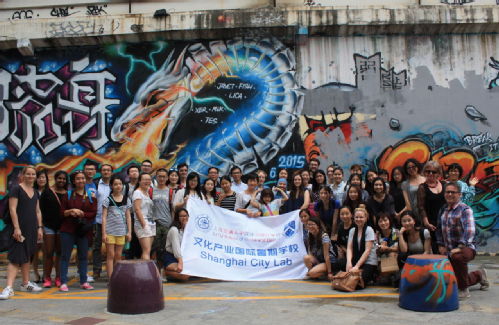
This year’s theme was “Work in the Cultural Economy”. We began with the questions -- What is it to work in the cultural economy? What kind of labour is involved, and what kind of skills are required? What kind of career strategies are needed? This was framed by Bourdieu's theory of the field of cultural production and the 'trajectory' cultural producers within it. These questions continued throughout the various lectures, discussions and site visits. And mostly because we had some great visiting professionals, as well as visiting scholars, students were able to find out what working in the creative field like in Shanghai.
Lectures included:
Justin O’Connor (Monash University) on cultural economy, cultural field and cultural work.
Jonathan Vickery (Univeristy of Warwick) on cultural policy, cultural economy and cities.
Gu Xin (Monash University) on the field of Chinese contemporary art, creative city and creative clusters.
Scott Brook (University of Canberra) on Bourdieu, applied field theory, the literary field and cultural work in Australia.
Jen Webb (University of Canberra) on graduate careers and creativity.
Shan Shilian (Shanghai Jiao Tong University) on China’s cultural policy.
Li Kanghua (Shanghai Jiao Tong University) on Shanghai’s cultural economy and policy contexts.
Deng Lin (Shanghai Jiao Tong University) on cultural economy field research.
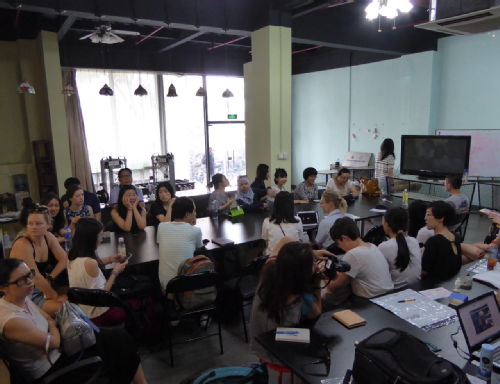
[This picture above was our seminar in a Maker space in Shanghai]. Our visiting professionals included Professor Wang Hong Tu of China’s first MFA program at Fudan University – talking about Shanghai’s literary field and the life young creatives can expect. Lisa Movias, now head of the China bureau of the Art Newspaper, talked to us about Shanghai’s emerging cultural milieu and the new venues in the city. Social theatre pioneer, Zhao Chuan, told us about experimental Chinese contemporary art in Shanghai and particularly his Grassroot Stage organization. Advertising guru Peter Soh gave us an insight into the communications media industries in the city, and Linda Lin similarly opened up the animation industry, with particular reference to its global influences.
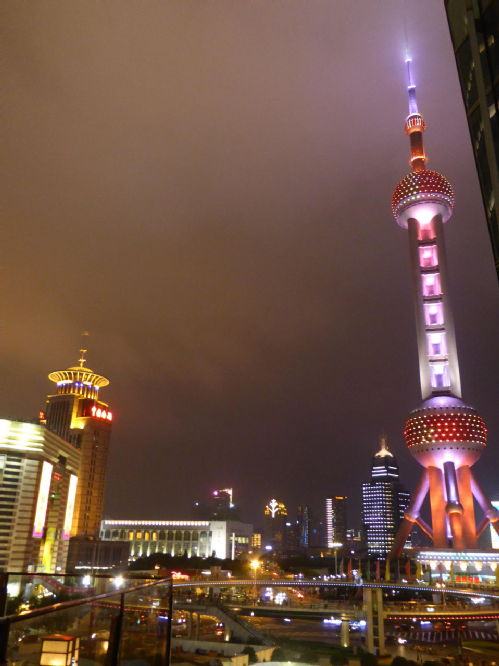
Our site visits this year – both tutor-led visits, with talks, and the students own group research – included the Rockbund Art Museum; The Shanghai Bund; the Old Town; the old EXPO 2010 site – particularly the China Art Museum and the Power Station of Art.
We paid particular attention to two urban phenomenon – first, the new West Bund Cultural Corridor (including the Long Museum, Yuz Museum, K11 art space, Photography Museum, and the public art and design of this expanse of land); and second, the Creative Clusters, particularly Creative Warehouse, Tianzifang, South Suzhou River, M50. We also had a day discussing Maker and Hacker culture, with site visits to pioneer David Li’s space in south Shanghai, and new enterprise DF Robot, and their community space at the giant technology enterprise park in Pudong.
The two weeks ended with two days of student group research in the city, where each student chose a site and topic for investigation. Research methods could be experimental – using film and photography – or standard methods, like interviews, observation, compiling data. On the last day – the Friday – we heard all eight presentations, after which feedback was given, and then finally, all students received a signed and stamped certificate for successfully completing the Summer School.
For more pictures, see my Flickr site:
https://www.flickr.com/groups/2830292@N25/pool/
Summer module Event
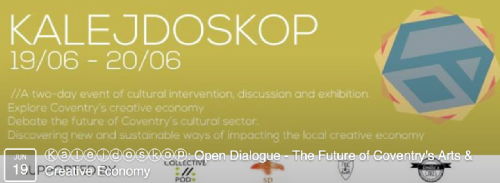
Last term’s summer ‘practice’ module – Culture and Social Innovation – saw a student group of eight generate a two day micro-festival. The site for this event was the NHS-City Council Mental Health and well-being centre, the POD, (situated in Coventry city centre). This site was not just a venue for a series of performances – the POD was a partner in delivering something that attracted over 100 people.It was exhausting (the run-up to the event involved weeks of non-stop work).
The brand concept for the event was the idea of student Emilia Moniszko – who is now developing KALEJDOSKOP as an independent arts platform. And to quote from its strategy document:
KALEJDOSKOP is interdisciplinary, and aims to combine some of the most dynamic aspects of contemporary art, the creative industries and social enterprises. It is a platform and will provide a space for launching new projects, events and initiatives. As an organisation, its priority will be production, engagement and generating value. As a series of events, its priority will be diversity, democracy, participation, and the ‘right to the city’. KALEJDOSKOP, fully developed, will act as agent, entrepreneur, creative producer, cultural management, researcher, consultant and advocate. It will both act on its own initiative, and in partnership.
The first KALEJDOSKOP event at Coventry POD lasted from Friday afternoon to Saturday evening – and whose dynamic program included the following: [SEE the Facebook page for more]
https://www.facebook.com/events/470151756495404/
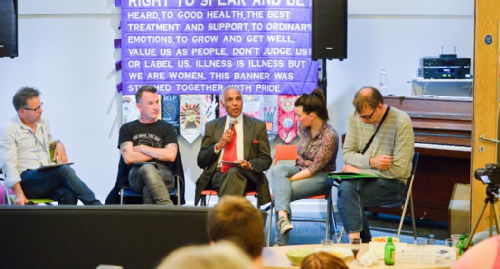
Friday Evening:
> Seven performances including: Poetry, South Asian Poetry, Rap, Fusion of Punk and Folk.
> An open discussion with a panel consisting of local small theatre director, artist, film-maker and a chair of BOPA.
> A short film screening of a film on Coventry’s history and cultural evolution.
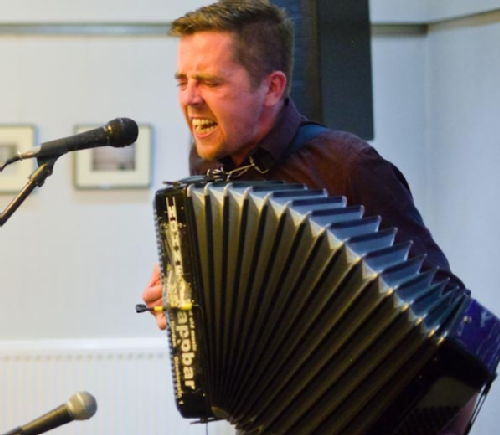
Saturday:
> An alternative tour of Coventry – walking the city’ – exploring urban memory, contested narratives of the city, commerce and anti-commerce, and the relation between culture and the social landscape.
> Food and drink buffet, representing the City’s cultural diversity
> A sonic improvisation with ‘Collective // Pod’ and members of the audience, against a screening of films created by West Midlands based filmmakers.
This event has generated a dialogue, from which the POD has invited KALEJDOSKOP to produce a Friday night special event once a quarter (three months), for a year. This will launch Emilia's career as a cultural entrepreneur once she has completed her MA (in October).
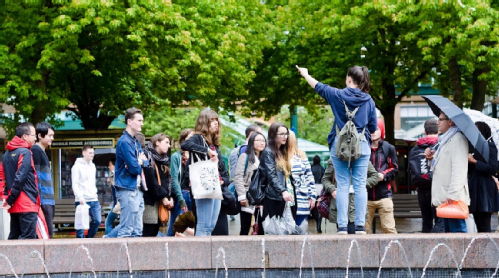
Spillover again…
I have blogged in the past about an emerging European research project on which I am a partner, and which in part grew out of some work I did with the European Centre for Creative Economy in Dortmund in 2012-13. The last meeting in Essen in April saw the launch of a new Wiki space (photo below), and since then we have had the final report from our consultants TFCC (Tom Fleming Cultural Consultancy). See also links below – then my comments will follow, but these pertain to the as-yet-to-be published Final Report. I think this will come out very soon – our next scheduled meetings are Amsterdam end of July, then Essen again in September.
https://ccspillovers.wikispaces.com
https://ccspillovers.wikispaces.com/Results+and+report
On the Final report -- I think an important aspect of the report is the importance awarded to objective, impartial and wide-ranging research – this is important in two respects (i) research (particularly for arts organisations or policy consultancies) is so often 'information gathering' or the production of ‘evidence’, which, as we know, is required to inform or legitimate decision-making. With research on spillover, however, the ‘information’ is not simply ‘there’ to be gathered; it is embedded in forms of knowledge and practice that need to be explored. The old dichotomy of positive and exploratory research (or however you want to phrase it) is not useful here. Research will be more process-oriented, as along the way we need to discover possibilities, conditions of thinking, as well as practice, overturn assumptions on the nature of phenomenon like 'impacts' or 'benefits', and the definition of valid aims – at least, this is what we have found in aiming for a paradigm shift in our understanding of the socio-economic function of the cultural sector. I must admit, I have been getting impatient on how the project has taken almost two years just to define its aims and scope, but on reflection see that this time was needed – and the process has been as significant as what we have ended up with (right now two reports and a wiki page).
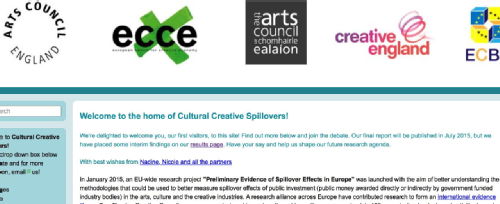
(ii) There are some institutional problems with spillover research. It contains what is outside the usual orbit of cultural research – where the people, the organisations, the products, the outcomes, are clearly delimited -- a spillover involves all, or a number of these, with uncertain outcomes. The centrality of free and impartial research is important given the complex ‘ontology’ of the spillover phenomenon – in its broadest sense. Certain forms of spillover can emerge spontaneously, and, at the time, largely undetected. We will need to re-define ‘evidence’, or the material for thought, or at least become more innovative in our understanding of how data can be used. In theory at least, there’s no reason why spillover is not ‘whirlpool-like’, with multiple spillover impacts generated by primary spillover effects or all kinds of compound reactions going on – in the age of virtual knowledge ‘Iconomies’ and post-Triple Helix model…[cf. Professor Gilson Schwartz’s recent Centre organised IAS-fellowship lectures] where new patterns of knowledge production are emerging, through mobile, innovation networks, commons, the ‘gamefication’ of collaboration: it is not so much the ‘effects’ we are looking for, but the way culture and CC actors can engage strategically in open innovations and generate value for and from spillover dynamics. As a research aim, we are starting to look for levels of spillover beyond ‘impacts’ – i.e. not just conceived as one object hitting another object, generating something obvious out of the impact -- or all those other externalities that happen as a matter of course. Spillover is moving more into a productive process outside of organizational entities, with layered dynamics and many possible points of value diffusion or dissemination…and various networked actors or agencies involved in various parts of the process. The underlying assumptions of our spillover concept is still rooted in the old incubator-investment-Silicon Valley, organisation-based, model?
One challenge we face is that our rationale for spillover research (and a large part of the motive of the main funding partners – Arts Council England, for starters) is that spillover can provide a broader route to justifying public investment in culture. In making an emphatic appeal for public investment, I think we need to firm-up our concept of ‘public investment’, particularly in relation to the ambiguous role of government in cultural policy as well as the different and shifting constitution of ‘public’ within each EU country – and in relation to EU level bodies. This is true in terms of the way ‘public’ funding is often calibrated, using partnership agreements, mixed or blended funding, and involving entrepreneurship.
Given, as the Final Report states, we are not rehearsing an argument for public funding per se, we also need to explore what we mean by ‘investment’, given that our understanding of a ‘return’ is more complex than the past policy language of benefits or value. For if spillover is as significant as we think it is – involving the broader milieu, habitus, social, industrial or organisational fields in which cultural activity does or can operate -- then we might find a tension opens up between the assumptions underpinning broad public funding and the specific aims of public investment for new or increased value. For it would make sense for public funders to progressively prioritise cultural organisations or CCIs that have spillover capabilities – or even fund spillover activity as a distinct genre of value production. If spillover becomes equally as important as the value generated by the core competencies of cultural organisations, then spillover could change how those competencies are configured or exercised.
What I like about the Final Report, and the project as it is developing, is the way we insist that the orientation and ‘framing’ of research is informed by the current requirements of both policy and strategy -- that there should be a consistent dialogue between the enterprise of research and the debates and thinking-processes of policy and its implications for strategy (i.e. policy interpreted at the level of the organization or practice). These areas should not be run together, or research be treated like the handmaiden of policy, but they both involve separate discourses, values and procedures.This could be problematic, or could be a needed level of critique on the way publicly-subsidised cultural organisations work.
I think we probably need a distinct and strong agenda for each of three quite different levels and their audiences – the research and academic communities, the policy community (bringing together national and EU policy thinkers, so often working apart), and the level of cultural managers, entrepreneurs and industry innovators (both inside and outside the creative industries). And one important dimension of spillover research is how it can broach the separation of the constituencies that represent the public ‘cultural sector’ and the ‘creative industries’. While, self-evidently, publicly subsidized institutions and commercial businesses operate in very different financial ecosystems, our concern is to find how reconstructed public policies can be instrumental and empowering to both. Up to now, urban policy (creative class, creative city) has been the means to integrate culture’s torn halves or define how arts and CCIs are bound up. However, this has reached its limits. Spillover could define a more effective framework for a fully ‘cultural’ economy.
Debt and the Public University
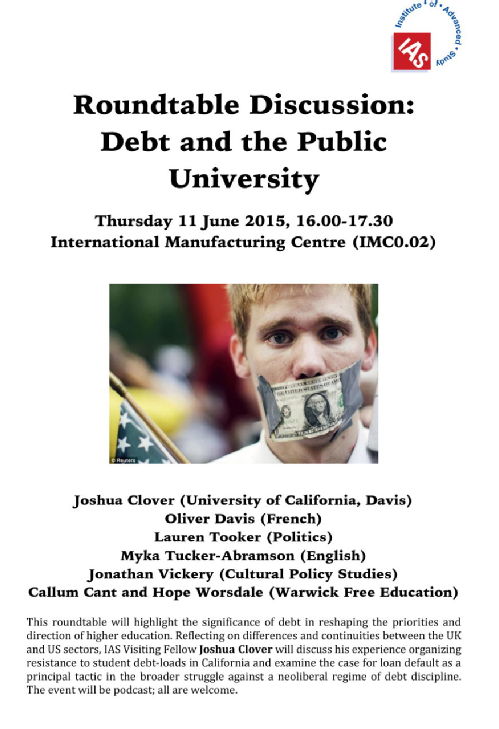
On the 11th June I was one of a Roundtable Discussion Panel, called ‘Debt and the Public University’ (2015, 16.00-17.30 International Manufacturing Centre). The Panel featured Oliver Davis (French), Lauren Tooker (Politics), Myka Tucker-Abramson (English), Jonathan Vickery (Cultural Policy Studies), Callum Cant and Hope Worsdale (Warwick Free Education). The occasion was IAS Visiting Fellow Joshua Clover – a notable scholar from University of California, Davis, award-winning poet, and radical activist. Clover is known for his theories of ‘crisis capitalism’, organizing resistance to student debt-loads in California, and his focusing on the significance of debt in reshaping the priorities and direction of higher education. This Panel was asked to tackle two questions – concerning our understanding of the nature of debt, and our understanding of how it is changing our profession (and by implication, the student—professor relationship).
My contribution, on reflection, contained some mawkish nostalgia for the days when student fees were ushered in by New Labour. Yes, it was the Left who introduced student fees. Blunkett, a one-time far-left local government activist, vowed they would not rise from the £1000 per annum limit at which he had set it (which, I remember, sounded hollow even at the time – even if, even then, the £1000 seemed more like a heavily subsided contribution rather than a costed fee). More importantly was how the Left rationalised this decision. I remember several lines of debate, not least references to how Blunkett’s ‘Methodism’ (as with Gordon Brown’s Scottish Calvinism later) introduced a component of personal responsibility to public expenditure (as a moral obligation of government) -- teaching youngsters the ‘true’ value of money’ was surely a good thing. Other, more political lines of argument, went something like (and I paraphrase) ‘plumbers and builders should not be subsidising the education of the middle classes’; another argument was similarly made on ‘class’ grounds, albeit policy-based: ‘Fees will be means-tested, in reality only paid by ‘middle class’ students, providing a raft of scholarships for all ‘working class’ students’. Fees could thus introduce a new financial mechanism of social equality. At the time, the former (ethical) argument and the latter (foiled) plan, were both subsequently inadequate to the shifts in both political thinking and public opinion that emerged. From this two things are obvious: that public policies (like fees for higher education) are rarely subject to thorough research and evaluation and a management of their consequences -- policy makers often have little imaginative anticipation of the lateral or unintended outcomes of their policies. Debt has generated social conditions that threaten to exceed the very orbit of public policies, and like a runaway train, are generating problems so pervasive they will cease to be categorised as ‘student debt’. And further – with reference to Joshua Clover’s various talks, lectures and statements (on You Tube, for example) – this exceeds the often mundane arguments between the current political ‘Left and Right’.
Clover’s thinking on this subject by-passed a lot of the chatter on the current affairs of subsidy, costs or particular HE policies. Debt, rather, has become a structural feature of global 'crisis capitalism'. Debt has become an industry, and so an embedded part of the economy. The agents of debt (between 2006-10) brought Western economies to their knees, degrading or wiping out generations of workers investments, labour pensions and the accumulated savings of ordinary citizens. Student fees – and with it the financial structures of higher education – are being systematically absorbed into this industry, and while banks and politicians alike tend to frame student fees in terms of ‘investment’ or even ‘credit, of which there is precious little policy research on the long term consequences and political implications. That debt is systematic and pervasive generates a new economic reality, to the extent that all parties, Left and Right, now accept it as a matter of fact, or an epiphenomenon of a global economy outside the political influence of any one government or even one global agency. And so what started with a perfectly reasonable attempt to introduce some moral responsibility into public finance ends up as some Frankenstein monster that, right now, doesn’t benefit anyone except the most dangerous actors on the economic stage.
 Jonathan Vickery
Jonathan Vickery

 Please wait - comments are loading
Please wait - comments are loading

 Loading…
Loading…

